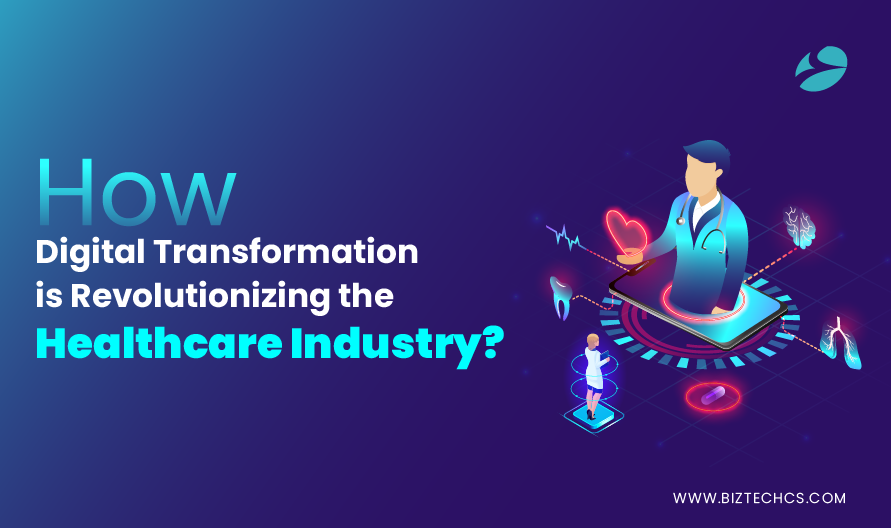3238
Digital Transformation in Healthcare: Trends 2025
5 min read
3238
5 min read
Table of Content

Through digital transformation, the landscape of the healthcare setting and the way people receive the services is evolving.
Telemedicine via the Internet and AI-based diagnosis and treatments are already proving effective in enhancing patient outcomes.
Health facilities are implementing various technological solutions to enhance efficiency and minimize mistakes.
Deloitte notes that digital healthcare, in particular, can contribute up to $200 billion in industry savings by 2025.
Such improvements are also bringing universal health care to individuals worldwide. In this blog, we will discover how healthcare and lifescience industry are being transformed by digital transformation.
1. Patient Care
Many patients benefit from digital transformation in healthcare due to enhanced personalization.
Telemedicine means that patients can receive their doctor’s advice from the comfort of their own homes, which helps people gain easier access to medical services.
Wearable devices and remote monitoring enable constant tracking of vital signs, thus escalating intervention as required.
Applying technology in the health sector has advantages: it is convenient and gives faster results.
Healthcare is among the industries that must embrace change through digital transformation to improve patient care.
2. Data Management
Consider a situation whereby physicians can type your name on the computer, and you get all the details of your past life.
That is the magic of digital transformation in healthcare using EHR and AI-enabling tools and technologies. This change in healthcare delivery has the advantage of faster data delivery and, hence, faster analysis.
More adoption of technological advancement in handling health records, such as using intuitive platforms like Sprypt’s EMR, leads to reduced writing and more time spent on patient care.
They all identify that using technology in healthcare has been one of the best strategies in decision-making, results, and costs.
According to eSystems, following master data management best practices can further ensure that patient information remains consistent, accurate, and reliable across all healthcare systems.
Some industries require digital change, and the change is happening, for example, in healthcare, where care is now provided through far more innovative systems.
3. Operational Efficiency
Another area heavily impacted by Digital Transformation In Healthcare is the administrative aspect of it.
In Digital Innovation in Healthcare, the intelligent system seamlessly executes functions such as billing, scheduling, and claims processing. This can help reduce manual work content, increase work efficiency and accuracy, and save time.
The Digitization Of Healthcare helps make all functional activities convenient, enabling healthcare staff to dedicate their efforts to patient care.
Other advantages mentioned in The Benefits Of Digital Transformation In Healthcare are less fallibility and quicker procedures, which proves how necessary it is for Industries That Need Digital Transformation, such as the healthcare industry, to adopt it.
4. Supply Chain Management
Digital transformation in healthcare has brought along a number of changes with particular emphasis to the management of administrative work.
Using Healthcare Digital Transformation processes such as billing, scheduling, and claims will be done with less time, and many mistakes will be prevented. This Digital Innovation In Healthcare enables employees to work more on the healthcare needs of the patients.
The Advantages Of Technology In Healthcare include enhancement of flow and precision, which are decisive in efficiency.
Sectors such as Industries That Need Digital Transformation, like the healthcare system, are experiencing the advantage of the Digitization Of Healthcare, which improves and enhances healthcare service delivery systems.
5. Medical Research
A promising Digital Transformation In the Healthcare area is drug discovery and clinical trials.
Healthcare Digital Transformation with big data analytics and AI is continuing to add fuel to the wheels of treatment discovery. This Digital Innovation In Healthcare enables the researchers to process large data sets in a shorter time, providing quicker and more reliable outcomes.
There are some advantages of Digital Transformation In Healthcare, such as cutting the time delay for new drugs to come to the market and enhancing patient experience.
As one of the Industries That Need Digital Transformation, healthcare leverages these tools, making the Digitization OF Healthcare a powerful driver of changes in medical research.
1. Improved Patient Outcomes
Digital transformation in healthcare is revolutionizing how we care for patients. Through personalized treatment plans based on individual history, genomics, and genetic variant interpretation, healthcare providers can offer more precise and effective care. Predictive analytics is helping to catch health issues early, preventing problems before they escalate, while remote monitoring and telemedicine ensure continuous care even from a distance. These innovations are some of the many benefits of digital transformation in healthcare, including enhanced patient flow management, showing why it’s one of the key industries that need digital transformation to improve patient outcomes and care efficiency.
2. Cost Reduction
One of the most impactful benefits of digital transformation in healthcare is the ability to reduce costs while improving patient outcomes. Through digital innovation in healthcare, telemedicine and remote monitoring lower readmission rates, keeping patients healthier at home. AI helps optimize treatment plans and detect fraud, making the digitization of healthcare both efficient and secure, showing why healthcare is one of the industries that need digital transformation most.
3. Improved Patient Engagement and Experience
Imagine being able to book a doctor’s appointment or check your medical records with just a few taps on your phone. This is the power of digital transformation in healthcare, where patient portals and mobile apps make it easier to connect with providers, improving engagement and satisfaction. From personalized chatbots answering questions instantly to telemedicine bringing care to your home, digital innovation in healthcare is making care more convenient and accessible, highlighting the benefits of technology in healthcare and the transformation many industries need.
4. Telemedicine and Remote Healthcare Services
Another benefit of digital transformation in healthcare is expanded access to services through telemedicine, especially for patients in rural or underserved areas. This healthcare digital transformation allows specialists to provide care remotely, making chronic disease management more personalized and efficient. Virtual care platforms, a result of digital innovation in healthcare, offer continuous support, making it easier for patients to receive timely interventions, highlighting the many benefits of technology in healthcare.
1. Wearable Health Tech
Wearable health tech is set to grow as more devices monitor real-time data, helping people take better care of their health. These gadgets track vital signs like heart rate, sleep patterns, and physical activity, offering early warnings for potential health issues. With this data, doctors can provide more personalized and preventive care. As healthcare becomes more digital, these wearables will play a key role in keeping people healthier and reducing the need for urgent treatments.
2. Blockchain for Data Security
Blockchain is emerging as a future trend in healthcare to ensure secure and transparent data management. It creates an unchangeable, shared ledger that helps protect patient data from unauthorized access. Healthcare providers can use blockchain to track and verify every change made to records, ensuring transparency and trust. This technology will enhance data security while giving patients more control over their health information.
3. Robotic Process Automation (RPA)
Robotic Process Automation (RPA) is set to streamline administrative and routine clinical tasks in healthcare. By automating repetitive processes like scheduling, billing, and data entry, it frees up time for healthcare workers to focus on patient care. This efficiency boost helps reduce errors and improve the speed of operations. As digital transformation advances, RPA will play a key role in making healthcare systems more efficient and responsive.
4. Virtual Reality (VR) in Therapy
Robotic Process Automation (RPA) is transforming healthcare by automating repetitive administrative and clinical tasks. It helps with things like scheduling, billing, and patient record management, freeing up time for healthcare workers. This makes processes faster and reduces human error, leading to better efficiency. As digital transformation continues, RPA will play a bigger role in improving the quality of care and streamlining operations.
In conclusion, digital transformation is changing the healthcare industry in powerful ways. It improves patient care through data-driven decisions and better access to medical records. Telemedicine makes healthcare more accessible, while AI helps in faster diagnosis. Wearable devices allow real-time health monitoring. Automation streamlines administrative tasks, reducing errors. Overall, it leads to more efficient, personalized healthcare.
At Biztech, we help healthcare organizations in their digital transformation journey. Our solutions ensure they stay ahead with modern technology and provide the best care to their patients.
Healthcare digital transformation companies help providers improve patient care by automating tasks, streamlining workflows, and using data for better decisions. They also implement tools like telemedicine and electronic health records, enhancing efficiency and reducing errors.
Exciting trends include AI-driven diagnostics, wearable health tech, and personalized treatment plans using data analytics. Virtual care and remote monitoring are also reshaping how patients access and receive care.
Patients, healthcare providers, and administrators all benefit from digital transformation through improved care delivery, faster access to information, and more efficient processes. It leads to better health outcomes and reduced operational costs.
Digital transformation is important because it modernizes healthcare, making it more efficient, accessible, and patient-centered. It helps providers deliver higher-quality care while keeping up with evolving patient needs and technologies.

Artificial Intelligence (AI)
77
By Nandeep Barochiya

Odoo
119
By Uttam Jain

Odoo
69
By Uttam Jain